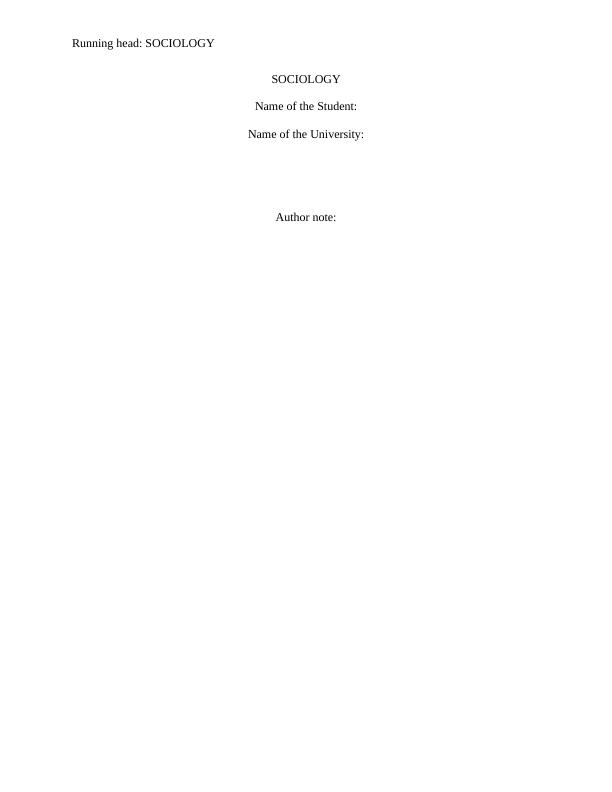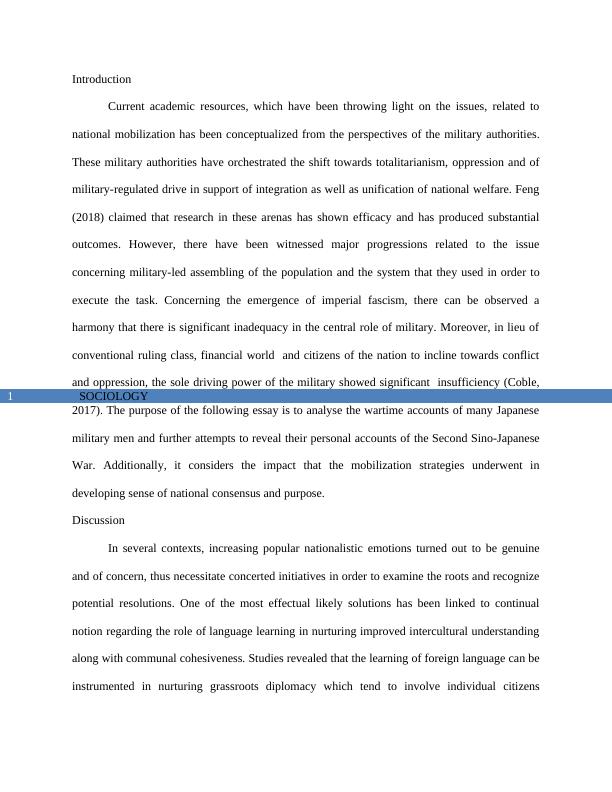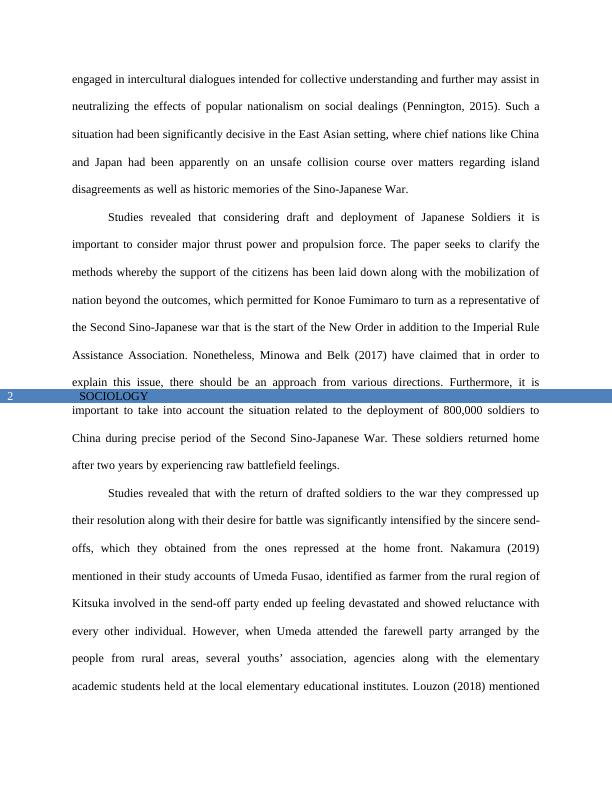Wartime Accounts of Japanese Soldiers in the Second Sino-Japanese War
Added on 2022-10-02
11 Pages2840 Words437 Views
Running head: SOCIOLOGY
SOCIOLOGY
Name of the Student:
Name of the University:
Author note:
SOCIOLOGY
Name of the Student:
Name of the University:
Author note:

SOCIOLOGY1
Introduction
Current academic resources, which have been throwing light on the issues, related to
national mobilization has been conceptualized from the perspectives of the military authorities.
These military authorities have orchestrated the shift towards totalitarianism, oppression and of
military-regulated drive in support of integration as well as unification of national welfare. Feng
(2018) claimed that research in these arenas has shown efficacy and has produced substantial
outcomes. However, there have been witnessed major progressions related to the issue
concerning military-led assembling of the population and the system that they used in order to
execute the task. Concerning the emergence of imperial fascism, there can be observed a
harmony that there is significant inadequacy in the central role of military. Moreover, in lieu of
conventional ruling class, financial world and citizens of the nation to incline towards conflict
and oppression, the sole driving power of the military showed significant insufficiency (Coble,
2017). The purpose of the following essay is to analyse the wartime accounts of many Japanese
military men and further attempts to reveal their personal accounts of the Second Sino-Japanese
War. Additionally, it considers the impact that the mobilization strategies underwent in
developing sense of national consensus and purpose.
Discussion
In several contexts, increasing popular nationalistic emotions turned out to be genuine
and of concern, thus necessitate concerted initiatives in order to examine the roots and recognize
potential resolutions. One of the most effectual likely solutions has been linked to continual
notion regarding the role of language learning in nurturing improved intercultural understanding
along with communal cohesiveness. Studies revealed that the learning of foreign language can be
instrumented in nurturing grassroots diplomacy which tend to involve individual citizens
Introduction
Current academic resources, which have been throwing light on the issues, related to
national mobilization has been conceptualized from the perspectives of the military authorities.
These military authorities have orchestrated the shift towards totalitarianism, oppression and of
military-regulated drive in support of integration as well as unification of national welfare. Feng
(2018) claimed that research in these arenas has shown efficacy and has produced substantial
outcomes. However, there have been witnessed major progressions related to the issue
concerning military-led assembling of the population and the system that they used in order to
execute the task. Concerning the emergence of imperial fascism, there can be observed a
harmony that there is significant inadequacy in the central role of military. Moreover, in lieu of
conventional ruling class, financial world and citizens of the nation to incline towards conflict
and oppression, the sole driving power of the military showed significant insufficiency (Coble,
2017). The purpose of the following essay is to analyse the wartime accounts of many Japanese
military men and further attempts to reveal their personal accounts of the Second Sino-Japanese
War. Additionally, it considers the impact that the mobilization strategies underwent in
developing sense of national consensus and purpose.
Discussion
In several contexts, increasing popular nationalistic emotions turned out to be genuine
and of concern, thus necessitate concerted initiatives in order to examine the roots and recognize
potential resolutions. One of the most effectual likely solutions has been linked to continual
notion regarding the role of language learning in nurturing improved intercultural understanding
along with communal cohesiveness. Studies revealed that the learning of foreign language can be
instrumented in nurturing grassroots diplomacy which tend to involve individual citizens

SOCIOLOGY2
engaged in intercultural dialogues intended for collective understanding and further may assist in
neutralizing the effects of popular nationalism on social dealings (Pennington, 2015). Such a
situation had been significantly decisive in the East Asian setting, where chief nations like China
and Japan had been apparently on an unsafe collision course over matters regarding island
disagreements as well as historic memories of the Sino-Japanese War.
Studies revealed that considering draft and deployment of Japanese Soldiers it is
important to consider major thrust power and propulsion force. The paper seeks to clarify the
methods whereby the support of the citizens has been laid down along with the mobilization of
nation beyond the outcomes, which permitted for Konoe Fumimaro to turn as a representative of
the Second Sino-Japanese war that is the start of the New Order in addition to the Imperial Rule
Assistance Association. Nonetheless, Minowa and Belk (2017) have claimed that in order to
explain this issue, there should be an approach from various directions. Furthermore, it is
important to take into account the situation related to the deployment of 800,000 soldiers to
China during precise period of the Second Sino-Japanese War. These soldiers returned home
after two years by experiencing raw battlefield feelings.
Studies revealed that with the return of drafted soldiers to the war they compressed up
their resolution along with their desire for battle was significantly intensified by the sincere send-
offs, which they obtained from the ones repressed at the home front. Nakamura (2019)
mentioned in their study accounts of Umeda Fusao, identified as farmer from the rural region of
Kitsuka involved in the send-off party ended up feeling devastated and showed reluctance with
every other individual. However, when Umeda attended the farewell party arranged by the
people from rural areas, several youths’ association, agencies along with the elementary
academic students held at the local elementary educational institutes. Louzon (2018) mentioned
engaged in intercultural dialogues intended for collective understanding and further may assist in
neutralizing the effects of popular nationalism on social dealings (Pennington, 2015). Such a
situation had been significantly decisive in the East Asian setting, where chief nations like China
and Japan had been apparently on an unsafe collision course over matters regarding island
disagreements as well as historic memories of the Sino-Japanese War.
Studies revealed that considering draft and deployment of Japanese Soldiers it is
important to consider major thrust power and propulsion force. The paper seeks to clarify the
methods whereby the support of the citizens has been laid down along with the mobilization of
nation beyond the outcomes, which permitted for Konoe Fumimaro to turn as a representative of
the Second Sino-Japanese war that is the start of the New Order in addition to the Imperial Rule
Assistance Association. Nonetheless, Minowa and Belk (2017) have claimed that in order to
explain this issue, there should be an approach from various directions. Furthermore, it is
important to take into account the situation related to the deployment of 800,000 soldiers to
China during precise period of the Second Sino-Japanese War. These soldiers returned home
after two years by experiencing raw battlefield feelings.
Studies revealed that with the return of drafted soldiers to the war they compressed up
their resolution along with their desire for battle was significantly intensified by the sincere send-
offs, which they obtained from the ones repressed at the home front. Nakamura (2019)
mentioned in their study accounts of Umeda Fusao, identified as farmer from the rural region of
Kitsuka involved in the send-off party ended up feeling devastated and showed reluctance with
every other individual. However, when Umeda attended the farewell party arranged by the
people from rural areas, several youths’ association, agencies along with the elementary
academic students held at the local elementary educational institutes. Louzon (2018) mentioned

SOCIOLOGY3
that behavioural patterns and attitudes of people who participated in the extensively enthusiastic
farewells particularly related to Women’s Association for National Defence, the Patriotic
Women’s Association, elementary and middle school students and young men’s association
served decisive role in intensifying the desire for war intended for military headed to the war.
However, while these soldiers departed for the front developed emotions of excitement and
willingness, particular question tend to rise regarding to what extent did soldiers justify in the
actual war experiences in China.
Seaton (2019) in his studies mentioned personal experience of another farmer from the
village of Abe named Hiraki Sadao who had been registered for active duty in the Tottori 40th
infantry regiment. He further mentioned that in August 15 of 1937, Hiraki left for the war and
battled in northern and central region China. He was then repatriated and after almost three years
in 1940, he received the Order of the Golden Kite. However, while considering his war camp
accounts it had been observed that firebombing had been considered as a typical occurrence. The
personal experiences of Hiraki recorded the conditions during the war of total destruction at
Xingjialou approximately Tai’erzhuang. At this juncture, Han (2017)gave special attention to
this arrival of Hiraki in addition to the descriptions of violent war whereby this participation of
Hiraki had been mandatory. Moreover, explanation of violent battle had not only been
frightening but also exhibited great complexities. Drawing relevance from two different types of
emotions Yang (2019) noted that the former pointed towards the emotion which had been
institutionalized, but gradually developing as the catalyst for the establishment of the imperial
oppressive regime based on the Emperor system.
On the other hand, the latter emotion underwent constraints and concealed from the view,
which failed to be expressed until Japan got defeated in the war. On the other side, another
that behavioural patterns and attitudes of people who participated in the extensively enthusiastic
farewells particularly related to Women’s Association for National Defence, the Patriotic
Women’s Association, elementary and middle school students and young men’s association
served decisive role in intensifying the desire for war intended for military headed to the war.
However, while these soldiers departed for the front developed emotions of excitement and
willingness, particular question tend to rise regarding to what extent did soldiers justify in the
actual war experiences in China.
Seaton (2019) in his studies mentioned personal experience of another farmer from the
village of Abe named Hiraki Sadao who had been registered for active duty in the Tottori 40th
infantry regiment. He further mentioned that in August 15 of 1937, Hiraki left for the war and
battled in northern and central region China. He was then repatriated and after almost three years
in 1940, he received the Order of the Golden Kite. However, while considering his war camp
accounts it had been observed that firebombing had been considered as a typical occurrence. The
personal experiences of Hiraki recorded the conditions during the war of total destruction at
Xingjialou approximately Tai’erzhuang. At this juncture, Han (2017)gave special attention to
this arrival of Hiraki in addition to the descriptions of violent war whereby this participation of
Hiraki had been mandatory. Moreover, explanation of violent battle had not only been
frightening but also exhibited great complexities. Drawing relevance from two different types of
emotions Yang (2019) noted that the former pointed towards the emotion which had been
institutionalized, but gradually developing as the catalyst for the establishment of the imperial
oppressive regime based on the Emperor system.
On the other hand, the latter emotion underwent constraints and concealed from the view,
which failed to be expressed until Japan got defeated in the war. On the other side, another

End of preview
Want to access all the pages? Upload your documents or become a member.
